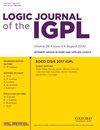用于估算剩余使用寿命的递归变异自动编码器方法
IF 0.8
4区 数学
Q2 LOGIC
引用次数: 0
摘要
本文提出了一种评估飞机发动机监测数据的新方法。通常,预报和健康管理系统利用某些发动机部件退化过程的知识以及专业专家的意见来预测剩余使用寿命(RUL)。新出现的数据驱动方法可提供精确的诊断,而无需依赖这种昂贵的过程。然而,这些方法大多缺乏解释性内容,无法理解模型学习和/或数据的性质。本文提出了一种基于新颖的循环版本 VAE 的解决方案,以克服这一缺陷。该模型利用放置在发动机不同部位的传感器的数据进行训练,所学习到的潜在空间被用来建立一个自解释地图,该地图可以直观地评估发动机的劣化率。此外,还在编码器所学特征的基础上建立了一个简单的回归模型,以便对 RUL 进行数值预测。结果,在美国国家航空航天局(NASA)提供的模块化航空推进系统模拟数据(C-MAPSS 数据集)上,预报准确率非常高,超过了大多数新颖先进的方法。此外,研究还包括涡轮风扇发动机数据的实际应用。这项研究表明,所提出的预测和可解释框架是一种很有前途的新方法。本文章由计算机程序翻译,如有差异,请以英文原文为准。
Recurrent variational autoencoder approach for remaining useful life estimation
A new method for evaluating aircraft engine monitoring data is proposed. Commonly, prognostics and health management systems use knowledge of the degradation processes of certain engine components together with professional expert opinion to predict the Remaining Useful Life (RUL). New data-driven approaches have emerged to provide accurate diagnostics without relying on such costly processes. However, most of them lack an explanatory component to understand model learning and/or the nature of the data. A solution based on a novel recurrent version of a VAE is proposed in this paper to overcome this gap. The latent space learned by the model, trained with data from sensors placed in different parts of these engines, is exploited to build a self-explanatory map that can visually evaluate the rate of deterioration of the engines. Besides, a simple regressor model is built on top of the learned features of the encoder in order to numerically predict the RUL. As a result, remarkable prognostic accuracy is achieved, outperforming most of the novel and state-of-the-art approaches on the available modular aero-propulsion system simulation data (C-MAPSS dataset) from NASA. In addition, a practical real-world application is included for Turbofan engine data. This study shows that the proposed prognostic and explainable framework presents a promising new approach.
求助全文
通过发布文献求助,成功后即可免费获取论文全文。
去求助
来源期刊
CiteScore
2.60
自引率
10.00%
发文量
76
审稿时长
6-12 weeks
期刊介绍:
Logic Journal of the IGPL publishes papers in all areas of pure and applied logic, including pure logical systems, proof theory, model theory, recursion theory, type theory, nonclassical logics, nonmonotonic logic, numerical and uncertainty reasoning, logic and AI, foundations of logic programming, logic and computation, logic and language, and logic engineering.
Logic Journal of the IGPL is published under licence from Professor Dov Gabbay as owner of the journal.

 求助内容:
求助内容: 应助结果提醒方式:
应助结果提醒方式:


